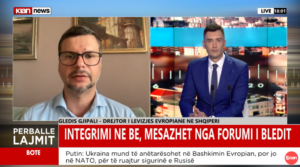Klan News – Gledis Gjipali: EU Enlargement a historic opportunity for Albania, but nothing is certain, 2 September 2025
 Invited to Klan News to analyse Albania’s EU integration path, Gledis Gjipali, Executive Director of the European Movement in Albania (EMA), offered an extensive commentary on the progress the country has made in this process. Gjipali highlighted the importance of the Bled Strategic Forum, noting its role in debating key issues related to enlargement and the future of the EU over the next 5–10 years, which also carry global implications.
Invited to Klan News to analyse Albania’s EU integration path, Gledis Gjipali, Executive Director of the European Movement in Albania (EMA), offered an extensive commentary on the progress the country has made in this process. Gjipali highlighted the importance of the Bled Strategic Forum, noting its role in debating key issues related to enlargement and the future of the EU over the next 5–10 years, which also carry global implications.
Furthermore, Gjipali stressed that the steps taken by Albania are being viewed positively by the EU Commissioner for Enlargement, Marta Kos. This recognition comes as a result of the country’s consistent and solid work in advancing reforms across various areas and in sequentially opening negotiating clusters. He even pointed to 2028 and 2029 as the most realistic dates for the accession of Montenegro and Albania to the EU. Although enlargement is seen in a positive light, Gjipali argued that recent developments such as the Covid-19 pandemic, the war in Ukraine, and the U.S. President Donald Trump’s treatment of the EU as a competitor, have reshaped the EU’s decision-making strategy. Nevertheless, Albania, Montenegro, and the entire Western Balkans must continue working diligently not to lose the favourable momentum they currently enjoy.
On the issue of reforms, Gjipali emphasized that Albania must pay close attention to negotiating clusters related to the rule of law, the implementation of judicial reform, the fight against corruption and organized crime, and the respect of human rights. At the same time, he noted that the country remains underprepared in areas such as the environment, food safety, and consumer protection, which require additional technical and financial investments from both businesses and citizens.
In conclusion, Gjipali underlined that beyond reforms, Albania must also resolve its bilateral issues with Greece. He further noted that the establishment of a new international order could slow down the accession of new states, making treaty changes necessary in the future. Finally, he stressed that although the EU and the U.S. may see each other as competitors, they must remain in constant dialogue in order to pursue joint and coordinated policies.





